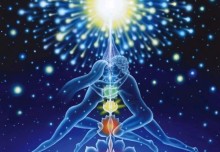Mastering Sexual Desire by Cyntha Gonzalez
Ramadan will begin this weekend, heralding in a lunar month-long fast from food and drink during daylight hours. Of the 1.6 billion Muslims worldwide that observe this purification period, they will also abstain from any sexual activity from sunrise to sundown and cool off seduction – subtle or full-on. What continues to motivate Muslims for centuries to adhere to this? What are the reported benefits and how is this similar and different to other paths of sexual celibacy?
Years ago, long before living in the Middle East, I was invited by Moroccan friends to join them in Meknes of central Morocco, during Ramadan. I was greeted by the hostess, Suhaira, a real beauty with her sun-kissed blondish long hair, green eyes and copper skin. She was dressed more subdued than her usual sensual, glam style. “I don’t recognize you without the gold jewellery and chic finds from your Paris shopping trips,” I teased her. She nonchalantly, confidently responded, “It’s Ramadan.” Over the 10 days I spent with this international, liberal family, I learned about the art of modesty and letting go of seduction for a month – not out of suppression but rather an exploration into the subtle ways I unconsciously used seduction to remind myself that I was attractive and ultimately lovable. I was even surprised to see a tenacious hanging on to certain props that gave me confidence, whether it be a certain pair of earrings or my brown eyeliner. In my ignorance, before I had come, I had painted my nails with red polish. I removed the varnish and joined in this more discreet practice as an experiment to experience the promised spiritual benefit.
Anne Wilson-Schaeff, in Escape from Intimacy, names our mild or full-blown sex addictions as also including seduction. By letting go of needy seduction and more ego-based sex, we are challenged to face our co-dependency and come to deeply love ourselves, just as we are. The invitation is to ultimately go to Source, rather than feed these dependencies otherwise – whether that be through porn, needy sex, disconnected sex or a round of Botox injections.
There are two ends of the spectrum when it comes to taming sexual desire:
One end is the wagging finger with the controlling, disapproving look. It is painfully repressive, dogmatic, paranoid and uninspiring, which usually reflects unconscious self-hate and internalised toxic shame still unaddressed and unhealed in the one who is judging. The realities of ‘Catholic guilt,’ and honour killings are the fallout of such repression. Sexual anorexia may also result, which is a complete shutting down sexually and can be indicative of abuse, religious shaming or some other great trauma of loss or betrayal.
The other end of this spectrum is the genuinely devoted nun or the disciplined yogi choosing to redirect sexual desire towards a more refined union with the Divine. At a friend’s recent wedding in the south of France, I interviewed a guest, the Mother Superior of an order of cloistered nuns, and asked how she trains her novices in celibacy. Without hesitation, she matter-of-factly replied, “We focus on our love of Christ, through prayer and chant.” Indeed, Gregorian or Kirtan chants are stirring to the heart and soul in their longing and are viable ways to shift this energy.
Yogis stimulate the energetic anatomy of the body, including the chakras and nadis, and through vigorous breathwork and visualisation, redirecting the base energies of lust and desire upwards. The upper chakras are activated and the adept accesses states of Unitive Consciousness. During Ramadan, one fasts and prays lending the seeker to reach into higher, refined states. As the month carries on, physical weakness slows down the body and life and the ego is more tamed without the usual escapes and distractions of food, coffee, drink and cigarettes. Stillness prevails and silence becomes louder; the ephemeral Divine can be perceived and heard with the resulting heightened sensitivity.
Mirabai Starr comments, “In the love poems to God that the mystics write or channel, the soul usually plays the part of the lover and God masquerades as the Beloved. The soul is conceived of as feminine and God as masculine. She yearns; he eludes. He calls; she comes running. She dissolves into his embrace. This dissolving is an essential component to mystical union. This encounter is characterized by both longing and union, or suffering and ecstasy. It is also fraught with paradox because once the soul attains union with the object of her deepest desire, there is no one left to enjoy the results. Lover has merged with Beloved and all that’s left is love. The subject-object distinction dissolves. There is no longer an I, nor a Thou; it’s only One. There is no longer Lover longing for Beloved, there is only the reality of Love – unbounded, undifferentiated and absolute.”
We don’t necessarily have to be a hermetic mystic or take vows of celibacy to attain this One. There are the other options less demanding than the path of the devout monk, like architect Roberto, who is learning how to orgasm regularly without ejaculation. He is discovering the rewards of a redirected orgasm upwards into these spiritual energy centres, rather than the momentary satisfaction of a quick cathartic release. Natasha and Mahmoud engage in open-eyed sex where the ego is tempered, and sometimes slayed, in the Radical Honesty necessary to sustain such edgy intimacy. Sometimes they see the face of the Divine in the other and merge in pure love. Sometimes their lovemaking is everyday fare, but they have long ago decided to infuse their sex with intention and emotional risk. Kathleen is not in a relationship currently, but sublimates her raw, bubbling sexual energy into exquisitely crafted stain art glass designs that she spends hours on. Pete, works on an oil rig – 4 weeks on, 4 weeks off and throws his full energy into work and his passion of underwater photography when gone from his beloved wife.
Nearly every couple will go through separation, health issues or rough patches at some time. Learning the art of sublimation or going on a sexual fast occasionally can serve in these moments. More importantly, because sex addiction can be a slippery territory where we fall into escaping the pain of the human condition through unconscious sex, taking a break time to time also invites a revitalization of self-love.
Codependency tendencies are kept in check and there is a renewal of choosing to be with the other wholly and mindfully. Ultimately the Divine keeps its rightful place in our own life and as the pervasive Third of our existing or future couple. Desire is understood as something not to be discredited, but harnessed, ridden and embraced as the ticket and propulsion to the One.
For more information go to www.cynthagonzalez.com





